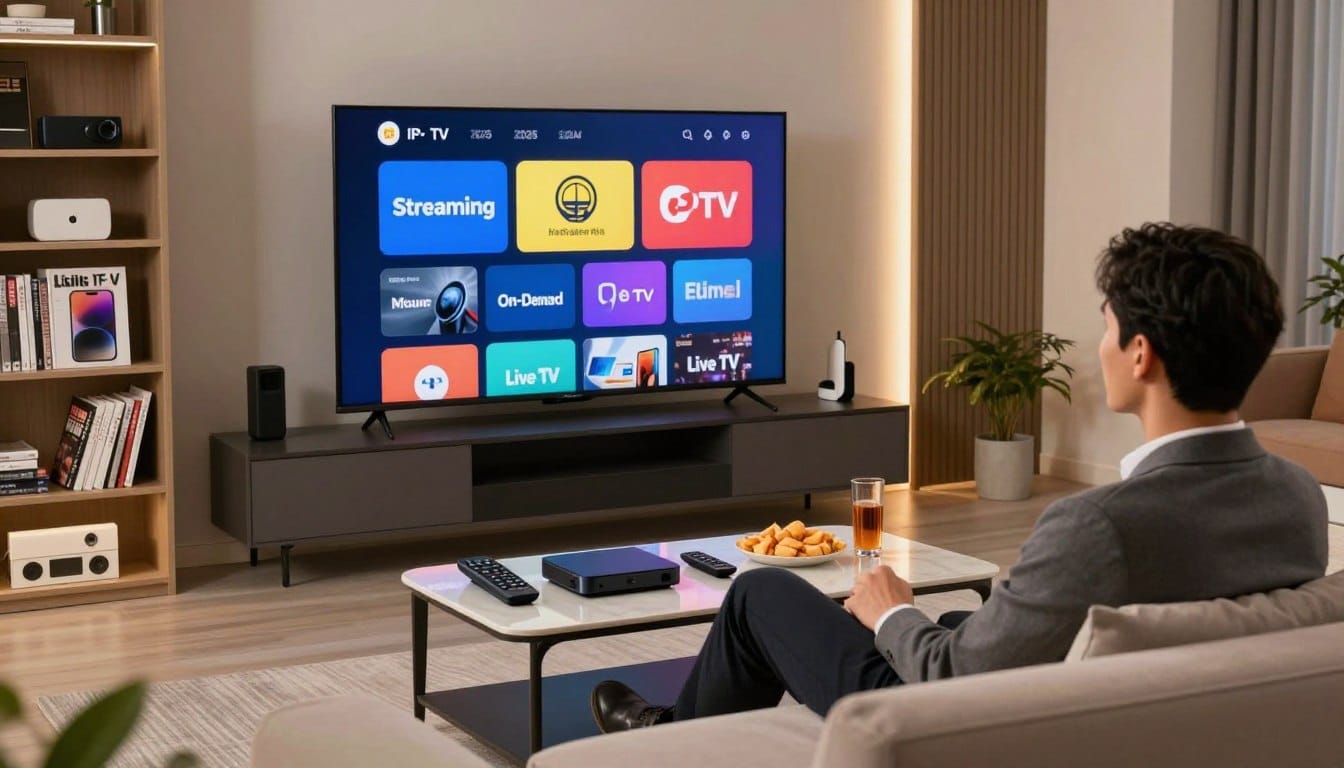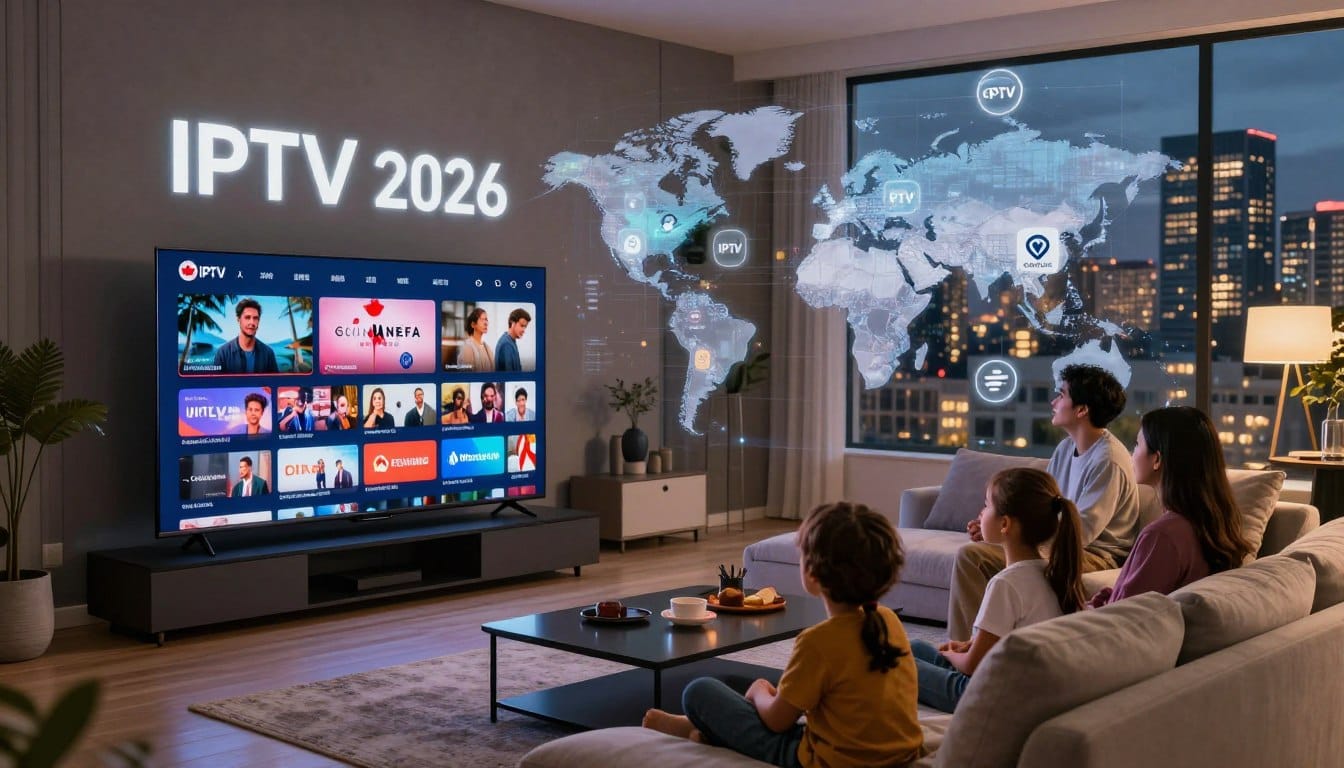In Canada, the way people consume television is changing with the advent of IPTV technology. An IPTV box is a device that allows users to stream television content over the internet, providing a more flexible and personalized viewing experience.
With an IPTV box, Canadians can access a wide range of channels and on-demand content directly on their smart TVs. This technology is revolutionizing the way people watch TV, offering benefits such as increased content variety and the ability to watch TV on multiple devices.
However, it’s essential to understand the legal considerations surrounding IPTV services in Canada to ensure a safe and compliant viewing experience.
Key Takeaways
- IPTV boxes offer a flexible and personalized TV viewing experience.
- They allow access to a wide range of channels and on-demand content.
- Understanding the legal aspects of IPTV services is crucial.
- IPTV technology is changing the way Canadians consume television.
- Smart TVs are integral to the IPTV viewing experience.
Understanding IPTV Technology
IPTV is transforming television viewing in Canada by utilizing internet protocol to stream content directly to viewers’ devices. This technology allows for a more personalized and interactive viewing experience compared to traditional television.
What Is IPTV and How Does It Differ from Traditional TV?
IPTV, or Internet Protocol Television, uses the internet to deliver television content, unlike traditional TV, which relies on satellite or cable signals. This fundamental difference enables IPTV to offer on-demand content and personalized viewing experiences. The table below highlights key differences between IPTV and traditional TV.
| Feature | IPTV | Traditional TV |
|---|---|---|
| Content Delivery | Internet Connection | Satellite/Cable |
| Viewing Experience | On-demand, Personalized | Linear, Scheduled |
The Technology Behind Content Delivery
The technology behind IPTV’s content delivery involves streaming media over the internet. This process requires a stable and fast internet connection to ensure high-quality video streaming. IPTV services use a combination of technologies, including content encoding, streaming protocols, and content delivery networks (CDNs), to deliver content efficiently.

By leveraging these technologies, IPTV providers can offer a wide range of channels and on-demand content, making it a compelling alternative to traditional TV viewing.
The Rise of IPTV Boxes in Canada
The rise of IPTV boxes in Canada reflects a broader shift towards internet-based entertainment solutions. This trend is driven by the convenience, flexibility, and wide range of content offered by IPTV services.
Growing Popularity Among Canadian Viewers
IPTV boxes are becoming increasingly popular among Canadian viewers due to their ability to provide on-demand content and live TV channels through a single device. This shift is largely driven by the desire for more control over viewing experiences.

Shifting from Cable to Internet-Based Entertainment
The transition from traditional cable TV to internet-based entertainment is a significant factor in the growing adoption of IPTV boxes in Canada. Here’s a comparison of traditional cable TV and IPTV services:
| Feature | Traditional Cable TV | IPTV Services |
|---|---|---|
| Content Availability | Limited to cable provider’s package | Wide range of on-demand content and international channels |
| Flexibility | Fixed viewing schedule | On-demand viewing, pause, and rewind live TV |
| Cost | Often more expensive with additional fees | Competitive pricing with various subscription models |
As Canadians continue to embrace internet-based entertainment, the demand for IPTV boxes is expected to grow, offering a more personalized and flexible viewing experience.
How an IPTV Box Works
Understanding how an IPTV box works is crucial for a seamless viewing experience. An IPTV box is essentially a device that connects to your television and streams content from the internet, providing an alternative to traditional broadcast television.
Hardware Components and Functionality
The hardware components of an IPTV box typically include a processor, memory, and storage. The processor handles the decoding and playback of video content, while the memory ensures smooth operation by temporarily storing data. The storage, often in the form of internal memory or external storage devices, holds the operating system, applications, and sometimes cached content for quicker access.
IPTV boxes also come with various ports for connectivity, such as HDMI for connecting to your TV, Ethernet for a wired internet connection, and sometimes Wi-Fi for wireless connectivity. Some devices may also include additional features like built-in Wi-Fi or support for multiple tuners, enhancing their functionality.
Connection to Your Home Network
To function, an IPTV box must be connected to your home network. This can be achieved through either a wired Ethernet connection or wirelessly via Wi-Fi. A stable internet connection is critical for uninterrupted streaming. The quality of your internet service will directly impact the performance of your IPTV box, with faster connections supporting higher quality video streams.
| Connection Type | Advantages | Disadvantages |
|---|---|---|
| Wired (Ethernet) | Stable, Fast | Limited by cable length, Less flexible |
| Wireless (Wi-Fi) | Flexible, Easy to install | Potential for interference, Less stable |
By understanding the hardware components and how to connect your IPTV box to your home network, you can optimize its performance and enjoy a superior viewing experience.
Types of IPTV Boxes Available in the Canadian Market
IPTV boxes in Canada come in various forms, each with unique features and benefits. The diversity in devices caters to different user preferences and viewing habits, ensuring there’s an IPTV box suitable for everyone.
Android-Based IPTV Boxes
Android-based IPTV boxes are highly popular due to their versatility and user-friendly interface. These devices run on the Android operating system, allowing users to access a wide range of apps, including IPTV services. Key benefits include: access to the Google Play Store, customization options, and compatibility with various IPTV providers.
MAG and Formuler Devices
MAG and Formuler devices are specialized IPTV boxes known for their high performance and reliability. They offer advanced features such as high-definition streaming, robust processors, and ample storage. These devices are ideal for: users seeking high-quality streaming and advanced functionality.
Smart TV Integration Options
For those who prefer a more integrated viewing experience, smart TV integration options are available. Many modern smart TVs come with built-in IPTV capabilities or can be adapted with IPTV apps. Advantages include: seamless integration with your existing TV setup and access to a range of IPTV services directly through your TV.
| Device Type | Key Features | Benefits |
|---|---|---|
| Android-Based IPTV Boxes | Access to Google Play Store, customizable | Versatile, user-friendly |
| MAG and Formuler Devices | High-definition streaming, robust processors | High-quality streaming, advanced functionality |
| Smart TV Integration | Built-in IPTV capabilities, IPTV apps | Seamless integration, direct access to IPTV services |
By understanding the different types of IPTV boxes available, Canadian consumers can make informed decisions based on their specific needs and preferences.
Setting Up Your IPTV Box
Configuring your IPTV box is the first step towards enjoying your favorite TV channels and on-demand content. The process involves a few straightforward steps that ensure you’re ready to stream your preferred entertainment.
Hardware Requirements and Connections
To start, you’ll need to ensure you have the right hardware. This typically includes the IPTV box itself, an HDMI cable for connecting to your TV, and a stable internet connection. Make sure your IPTV box is compatible with your TV’s resolution for the best viewing experience.
Software Installation Guide
Most IPTV boxes come with pre-installed software or an app store where you can download necessary applications. Follow the manufacturer’s instructions to install any required software or updates. This ensures your device is running the latest firmware.
“The key to a seamless IPTV experience lies in the proper setup and configuration of your IPTV box.”
— IPTV Expert
Configuring Your IPTV Service
After installing the necessary software, you’ll need to configure your IPTV service. This involves entering your subscription details and setting up your preferred channels or content libraries. Ensure your internet connection is stable to avoid buffering or streaming issues.
By following these steps, you’ll be able to enjoy a wide range of TV channels and on-demand content through your IPTV box. Remember, a successful setup is key to a great viewing experience.
Internet Requirements for Optimal IPTV Experience
To fully leverage IPTV technology, understanding the internet requirements is essential for Canadian users. A stable and fast internet connection is the foundation of a high-quality IPTV experience.
Recommended Internet Speeds for Different Quality Levels
The quality of your IPTV experience is directly related to your internet speed. Different streaming qualities require different speeds:
- SD (Standard Definition): 2 Mbps
- HD (High Definition): 5 Mbps
- Full HD: 10 Mbps
- 4K (Ultra High Definition): 25 Mbps
| Streaming Quality | Recommended Internet Speed |
|---|---|
| SD | 2 Mbps |
| HD | 5 Mbps |
| Full HD | 10 Mbps |
| 4K | 25 Mbps |
Dealing with Canadian ISP Limitations
Canadian ISPs (Internet Service Providers) vary in their offerings and limitations. Some may not provide the necessary speeds for high-quality IPTV streaming, especially in rural areas. To mitigate this, users can:
- Check ISP plans and choose one that meets their IPTV needs.
- Consider upgrading their internet plan if necessary.
- Use tools to monitor their internet speed and optimize their network.
As noted by a telecommunications expert, “The key to a seamless IPTV experience lies in a robust and reliable internet connection.” Ensuring that your internet meets the requirements for IPTV can significantly enhance your viewing experience.
IPTV Subscription Options in Canada
The IPTV landscape in Canada is diverse, offering multiple subscription choices that cater to different viewing preferences and budgets. As the demand for IPTV services continues to grow, various providers are emerging, each with unique offerings.
Service Provider Comparison
When choosing an IPTV service provider in Canada, it’s essential to compare the available options. Popular providers include IPTV-Smarter, Sling TV, and DAZN, each offering a range of channels and content. A comparison of these services reveals differences in pricing, channel lineups, and additional features such as DVR capabilities and simultaneous streams.
| Provider | Pricing | Channels | DVR |
|---|---|---|---|
| IPTV-Smarter | $69/year | 30k + channels | Yes |
| Sling TV | $35-$50/month | 30+ channels | Yes |
| DAZN | $19.99/month | Sports content | No |
Pricing Models and Packages
IPTV providers in Canada offer various pricing models and packages to attract a wide range of customers. Some services offer a flat monthly fee, while others provide tiered pricing based on the number of channels or type of content. For instance, family-friendly packages might include additional kid-oriented channels, while premium sports packages focus on sports content.
According to a recent report, “The average Canadian consumer is looking for flexible and affordable IPTV plans that can be tailored to their viewing habits.” This shift towards personalized viewing experiences is driving innovation among IPTV service providers.
“The future of TV is not just about watching content, it’s about experiencing it.”
— IPTV Industry Expert
Free vs. Paid Content Access
One of the critical decisions when selecting an IPTV subscription is whether to opt for free or paid content access. While free services may offer limited content, paid subscriptions provide a broader range of channels and on-demand content. In Canada, some IPTV services offer a mix of both, with basic free access and premium paid content.
- Free content: Limited channels, potentially with ads
- Paid content: Extensive channel lineup, on-demand content, and ad-free viewing
As the IPTV market in Canada continues to evolve, consumers have more choices than ever. By understanding the different subscription options, pricing models, and content offerings, viewers can make informed decisions about their IPTV services.
Content Available Through IPTV Services
The content available through IPTV services is vast and varied, catering to different tastes and preferences. IPTV services have transformed the way Canadians consume television, offering a wide range of content options that traditional TV cannot match.
Live TV Channels and Programming
One of the key features of IPTV services is the ability to access live TV channels and programming. This includes major networks, sports channels, news outlets, and entertainment programs, all available in real-time. Viewers can enjoy their favorite shows, stay updated with current events, and watch live sports, all through their IPTV device.
On-Demand Content Libraries
In addition to live TV, IPTV services offer extensive on-demand content libraries. These libraries include a vast selection of movies, TV series, documentaries, and more, allowing users to watch their preferred content at any time. The on-demand feature provides flexibility and convenience, making it a popular choice among IPTV subscribers.
International and Specialty Channels
IPTV services also provide access to international and specialty channels, catering to diverse cultural and linguistic preferences. Whether it’s a foreign language channel, a niche interest channel, or a specific genre like anime or classic movies, IPTV services offer a broad spectrum of options to suit various tastes.
Overall, the content available through IPTV services in Canada is rich and diverse, offering something for everyone. With live TV, on-demand content, and international channels, IPTV services have become a compelling alternative to traditional television.
Legal Considerations for IPTV Box Users in Canada
As IPTV technology continues to grow in popularity across Canada, understanding the legal implications of using an IPTV box becomes increasingly important. IPTV box users must be aware of the legal framework governing these devices to avoid potential issues.
Current Regulatory Framework
The use of IPTV boxes in Canada is subject to various regulations and laws. The Canadian Radio-television and Telecommunications Commission (CRTC) is the primary body overseeing broadcasting and telecommunications in Canada. IPTV services must comply with CRTC regulations, which include licensing requirements for content distribution.
Key regulatory aspects include:
- Licensing requirements for IPTV service providers
- Compliance with copyright laws
- Adherence to Canadian content regulations
The CRTC works alongside other organizations, such as the Canadian Intellectual Property Office, to enforce copyright laws and protect intellectual property rights.
Licensed vs. Unlicensed Content
One of the critical legal considerations for IPTV box users is the distinction between licensed and unlicensed content. Licensed content is provided by authorized IPTV service providers who have obtained the necessary permissions to distribute copyrighted material.
| Content Type | Licensed | Unlicensed |
|---|---|---|
| Live TV Channels | Available through authorized IPTV providers | May be accessed through unauthorized sources |
| On-Demand Content | Offered by legitimate IPTV services | Often found on pirate IPTV sites |
Using unlicensed IPTV services or devices that stream copyrighted content without permission is considered illegal and can result in penalties. Users should be cautious when selecting IPTV services and ensure they are using licensed providers to avoid legal repercussions.
Troubleshooting Common IPTV Box Issues
Troubleshooting your IPTV box can resolve many common issues, ensuring a smoother viewing experience. IPTV box users in Canada may encounter a variety of problems, but understanding how to address them can significantly enhance their entertainment experience.
Buffering and Streaming Problems
Buffering and streaming issues are often related to your internet connection. Checking your internet speed is a good first step. For high-definition streams, a minimum speed of 10 Mbps is recommended, though 25 Mbps or higher is ideal for more stable performance. If your speed is adequate, try restarting your IPTV box or checking for any software updates.
Connection and Authentication Errors
Connection and authentication errors typically indicate issues with your IPTV service provider or your device’s configuration. Ensure that your IPTV subscription is active and that your device is properly configured according to the provider’s settings. If issues persist, contacting your provider’s customer support can help resolve authentication errors.
Updating and Maintaining Your Device
Regularly updating your IPTV box’s software is crucial for maintaining optimal performance. Check for updates in your device’s settings menu, and follow the prompts to download and install the latest version. Additionally, periodically restarting your device can help clear out temporary issues and keep your IPTV box running smoothly.
| Issue | Troubleshooting Step | Solution |
|---|---|---|
| Buffering/Streaming Issues | Check Internet Speed | Ensure speed meets streaming requirements |
| Connection Errors | Verify Subscription Status | Ensure IPTV subscription is active |
| Authentication Errors | Check Device Configuration | Correct device settings as per provider |
Conclusion
The world of television is undergoing a significant transformation, and IPTV boxes are at the forefront of this change in Canada. As we’ve explored throughout this article, IPTV technology offers a flexible and personalized viewing experience, allowing users to access a wide range of content, from live TV channels to on-demand libraries.
With the rise of IPTV services, Canadians are no longer limited by traditional TV broadcasting schedules. Instead, they can enjoy their favorite shows and movies at their convenience, using devices that are increasingly user-friendly and feature-rich.
As the demand for IPTV boxes continues to grow, it’s clear that this technology is shaping the future of TV. By providing a more tailored and interactive viewing experience, IPTV services are poised to revolutionize the way we consume entertainment content. Whether you’re a cord-cutter or simply looking for a more flexible TV solution, IPTV boxes offer a compelling alternative to traditional TV viewing.
As Canada’s entertainment landscape continues to evolve, one thing is certain: the future of TV is here, and it’s being delivered via the internet.
FAQ
What is an IPTV box and how does it work?
An IPTV box is a device that allows users to stream television content over the internet. It works by connecting to a home network and accessing IPTV services, which provide live TV, on-demand content, and other video content.
What are the internet requirements for using an IPTV box?
To use an IPTV box, you need a stable internet connection with a minimum speed of 25 Mbps for 4K streaming, 10 Mbps for HD streaming, and 5 Mbps for SD streaming. A fast and reliable internet connection is essential for a smooth viewing experience.
Are IPTV boxes compatible with my smart TV?
Many IPTV boxes are compatible with smart TVs, but it depends on the specific device and brand. Some IPTV boxes come with built-in support for popular smart TV platforms, while others may require additional setup or hardware.
Can I record content using my IPTV box?
Some IPTV boxes and services offer recording capabilities, allowing users to record live TV and store it for later viewing. However, this feature may not be available on all devices or services, and may require additional configuration.
How do I choose the best IPTV service provider in Canada?
To choose the best IPTV service provider in Canada, consider factors such as content offerings, pricing, customer support, and device compatibility. Research different providers, read reviews, and compare their services to find the one that best meets your needs.
Are IPTV boxes legal in Canada?
IPTV boxes themselves are not inherently illegal, but using them to access unlicensed or pirated content is against the law. Ensure that you are using your IPTV box with a legitimate IPTV service that has the necessary licenses and permissions to distribute content.
Can I install apps on my IPTV box?
Many IPTV boxes, especially those running on Android, allow users to install apps from the Google Play Store or other sources. This can expand the device’s functionality and provide access to additional content and features.
How do I troubleshoot common issues with my IPTV box?
To troubleshoot common issues with your IPTV box, try restarting the device, checking your internet connection, and ensuring that your IPTV service is configured correctly. You can also consult the user manual or contact your IPTV service provider’s support team for assistance.
Can I use my IPTV box outside of Canada?
Some IPTV boxes and services may be usable outside of Canada, but this depends on the specific device and service. Check with your IPTV service provider to see if they offer international access, and be aware that geo-restrictions may apply to certain content.
What is the difference between a MAG and Formuler IPTV box?
MAG and Formuler are both brands of IPTV boxes that offer different features and capabilities. MAG devices are known for their versatility and customization options, while Formuler devices are often praised for their user-friendly interface and high-quality streaming.




